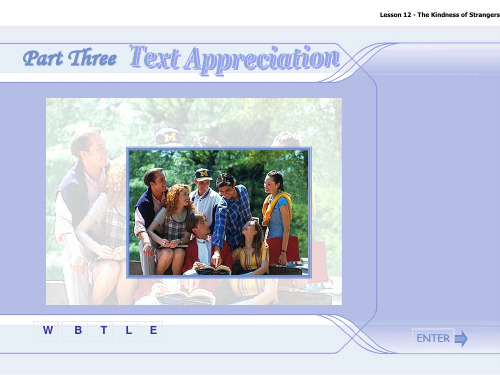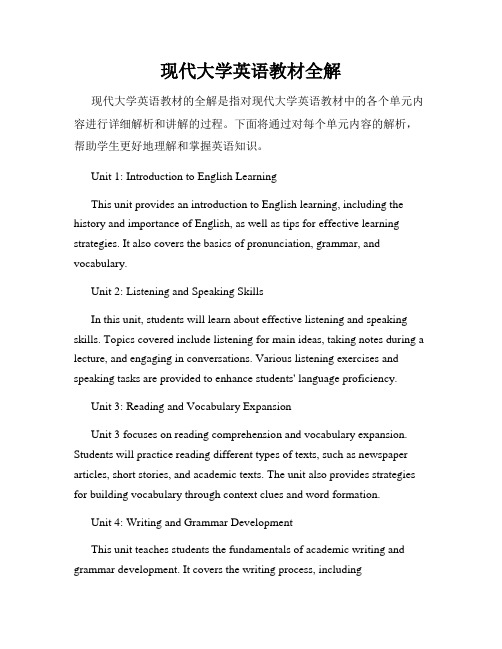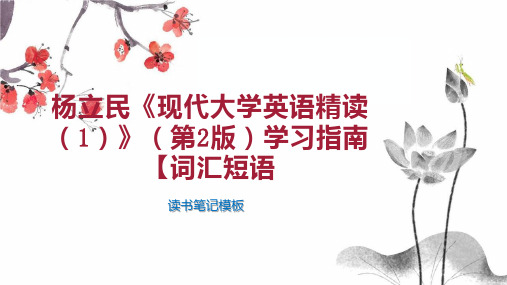现代大学英语课文重难点句子分析大一下
现代大学英语Lesson10(A)精读重点讲解

现代大学英语Lesson10(A)精读重点讲解现代大学英语Lesson10(A)精读重点讲解引言:每个地方对于生活在那里的人们来说都有特殊的意义,在某种程度上来说,每个地方都代表世界的中心。
世上有无数个这样的中心,没有一个学生或旅行者能全部经历到。
世界的文化中到处是富有特殊价值和意义而预料不到的青香蕉。
多年来它们一直在那里,慢慢地成熟,或许在耐心地等待人们走过去发现它们。
事实上,假如我们愿意离开我们自己的世界的中心,去感受其他的地方,青香蕉在等待我们每一个人。
The Green Banana---Donald BatchelderAlthough it might have happened anywhere, my encounter with the green banana started on a steep mountain road in the central area of Brazil. My ancient jeep was straining up through beautiful countryside when the radiator began to leak, and I was ten miles from the nearest mechanic. The over-heated engine forced me to stop at the next village, which consisted of a small store and a few houses that were scattered here and there. People came over to look. They could see three fine streams of hot water spouting from holes in the jacket of the radiator. "That's easy to fix," a man said. He sent a boy running for some green bananas. He patted me on the shoulder, assuring me that everything would work out. "Green bananas," he smiled. Everyone agreed.We chattered casually while all the time I was wondering what they could possibly do to my radiator with their green bananas. I did not ask them, though, as that would show my ignorance, so I talked about the beauty of the land that lay before our eyes. Huge rock formations, like Sugar Loaf in Rio, rose up allaround us. "Do you see that tall one right over there?" asked the man, pointing to a particularly tall, slender pinnacle of dark rock. "That rock marks the center of the world."I looked to see if he was teasing me, but his face was serious. He, in turn, inspected me carefully, as if to make sure I grasped the significance of his statement. The occasion called for some show of recognition on my part. "The center of the world?" I repeated, trying to show interest if not complete acceptance. He nodded. "The absolute center. Everyone around here knows it."At that moment the boy returned with an armful of green bananas. The man cut one in half and pressed the cut end against the radiator jacket. The banana melted into a glue against the hot metal, stopping the leaks instantly. I was so astonished at this that I must have looked rather foolish and everyone laughed. They then refilled me radiator and gave me extra bananas to take along in case my radiator should give me trouble again. An hour later, after using the green banana once more, my radiator and I reached our destination. The local mechanic smiled. "Who taught you about the green banana?" I gave him the name of the village. "Did they show you the rock marking the center of the world?" he asked. I assured him they had. "My grandfather came from there," he said. "The exact center. Everyone around here has always known about it."As a product of American education, I had never paid the slightest attention to the green banana, except to regard it as a fruit whose time had not yet come. Suddenly, on that mountain road, its time had come to meet my need. But as I reflected on it further, I realized that the green banana had been there all along. Its time reached back to the very origins of the banana. The people in that village had known about it for years. It was myown time that had come, all in relation to it. I came to appreciate the special genius of those people, and the special potential of the green banana. I had been wondering for some time about what educators like to call "learning moments," and I now knew I had just experienced two of them at once.It took me a little longer to fully grasp the importance of the rock which the villagers believed marked the center of the world.I had at first doubted their claim, as I knew for a fact that the center was located somewhere else in New England. After all, my grandfather had come from there. But gradually I realized the village people had a very reasonable belief and I agreed with them. We all tend to regard as the center that special place where we are known, where we know others, where things mean much to us, and where we ourselves have both identity and meaning: family, school, town and local region could all be our center of the world.The lesson which gradually dawned on me was actually very simple. Every place has special meanings for the people in it, and in a certain sense every place represents the center of the world. The world has numerous such centers, and no one student or traveler can experience all of them. But once a conscious breakthrough to a second center is made, a life-long perspective and collection can begin.The cultures of the world are full of unexpected green bananas with special value and meaning. They have been there for ages, ripening slowly, perhaps waiting patiently for people to come along to encounter them. In fact, a green banana is waiting for all of us if we would leave our own centers of the world in order to experience other places.青香蕉这件事在任何地方都可能发生,而我遇到青香蕉是在巴西中部的一条陡峭山路上。
现代大学英语3重点句子以及翻译

Lesson11)Has it ever occurred to you that your professors and other school personnel have certain goals for your growth and maturity during your college years?(P)Have you ever thought of the fact that your teachers and the staff have high expectations of you as you progress in both years and knowledge.(T)你是否曾经想到过你的教授和教务人员人员在大学学习期间为你确定了某些成长目标?2)…identity is determined by genetic endowment (what is inherited from parents), shaped by environment, and influenced by chance events.(T)性格特征是由先天基因(即父母的遗传物质)所决定,/在环境中成形/ 由外部环境而塑造,并受偶然事件的影响。
3)First, there is functional independence, which involves the capability of individuals to take care of practical and personal affairs, such as handling finances, choosing their own wardrobes, and determining their daily agenda.(T)第一,独立处理日常生活的能力,它包括个人独立处理实际和自身事务的能力,如理性消费的能力、选购服装的能力和决定每天工作日程的能力。
基础英语教学中的修辞手法赏析——以《现代大学英语》第一、二册为例

基础英语教学中的修辞手法赏析——以《现代大学英语》第一、二册为例李晓红【摘要】修辞是一种美化了的语言,是人类在漫长历史进程中所创造和积累起来的,含有丰富的文化底蕴.在我们传统的基础英语专业教学中,主要是低年级教学中,扩大学生词汇量成为专业教师们的首要任务,提高学生听力和口语表达水平也是教师们要达成的目标.在修辞的讲授和学习这一方面,教师们给予的关注不够明显.立足于教材,粗浅地探讨九种修辞手法在教材中的运用,力图从教材中探索和发现修辞的魅力,并将各种修辞手法融汇贯穿于课文讲述中,提高学生对文学作品的鉴赏力,激发学生产生情感共鸣.期望学生在良好学习动机刺激下对英语学习产生兴趣,并极大地提高英语水平,从而得到情感上的熏陶.【期刊名称】《海南广播电视大学学报》【年(卷),期】2018(000)001【总页数】4页(P28-31)【关键词】基础英语;教学;修辞手法【作者】李晓红【作者单位】四川外国语大学重庆南方翻泽学院国际商学院,重庆404100【正文语种】中文【中图分类】G645任何一个民族,无论其过去或未来文化如何发展,都需要依赖语言文字来传承与推进。
当我们在从事英语语言教学这一活动时,实质上,我们就在传播文化。
在传播文化过程中,作为教师本身,应该首先掌握好英语语言的规律,然后才能进行有效的教学工作。
它应该不仅是一种信息交流,同时也是进行情感交换、价值交换和思想交换的一种活动,一个过程。
一、修辞教学的必要性及定义在现今基础英语专业教学中,尤其是专业一年级和二年级阶段,专任教师的教学重点放在了扩大词汇量、提高听力和口语水平上面,但是对修辞教学重视不够或者是忽略不计。
笔者认为,修辞教学是必要的也是有意义的。
修辞是一种既特殊又普遍的语言现象,是人类在漫长历史长河中逐渐创造积累和发展起来的。
它在我们生活中时时处处发生,无所不在,是人类智慧和经验的结晶,含有丰富的文化底蕴。
而通过对修辞的学习,学生也能从中感受到语言知识的生动性,产生强烈的情感共鸣。
现代大学英语精读课文分析

W BTLE
The end of Theme.
The theme is summed up at the very end.
I. Text Analysis
Lesson 12 - The Kindness of Strangers
Structure of the text
The reason why the author Part 1 (paras. 1— 4 ) about: decided to start on this
How did he feel when he concluded his journey?
Has he found the answer to the question he had in mind?
W BTLE
The end of Further Discussion.
II. Writing Devices
W BTLE
To be continued on the next page.
I. Text Analysis
I didn’t know whether to kiss them or scold them for stopping.
Lesson 12 - The Kindness of Strangers
W BTLE
Lesson 12 - The Kindness of Strangers
Have you got the key
elements in the story?
I. Text Analysis
Lesson 12 - The Kindness of Strangers
Plot: The author traveled across the States alone to find out if people were willing to help strangers.
现代大学英语教材全解

现代大学英语教材全解现代大学英语教材的全解是指对现代大学英语教材中的各个单元内容进行详细解析和讲解的过程。
下面将通过对每个单元内容的解析,帮助学生更好地理解和掌握英语知识。
Unit 1: Introduction to English LearningThis unit provides an introduction to English learning, including the history and importance of English, as well as tips for effective learning strategies. It also covers the basics of pronunciation, grammar, and vocabulary.Unit 2: Listening and Speaking SkillsIn this unit, students will learn about effective listening and speaking skills. Topics covered include listening for main ideas, taking notes during a lecture, and engaging in conversations. Various listening exercises and speaking tasks are provided to enhance students' language proficiency.Unit 3: Reading and Vocabulary ExpansionUnit 3 focuses on reading comprehension and vocabulary expansion. Students will practice reading different types of texts, such as newspaper articles, short stories, and academic texts. The unit also provides strategies for building vocabulary through context clues and word formation.Unit 4: Writing and Grammar DevelopmentThis unit teaches students the fundamentals of academic writing and grammar development. It covers the writing process, includingbrainstorming, outlining, and revising. Additionally, grammar topics such as tense usage, sentence structure, and punctuation are discussed to help students improve their writing skills.Unit 5: Cultural AwarenessUnit 5 explores the cultural aspects of English-speaking countries. Students will learn about customs, traditions, and cultural practices to gain a better understanding of the target language. This unit also highlights the importance of cultural sensitivity in effective communication.Unit 6: Integrated SkillsIn this unit, students will integrate the four language skills: listening, speaking, reading, and writing. They will engage in tasks that require them to use all of these skills together, such as giving presentations, participating in debates, and writing essays. The unit aims to enhance students' ability to communicate effectively in various contexts.Unit 7: Test-Taking StrategiesUnit 7 focuses on test-taking strategies for English proficiency exams. Students will learn about different types of questions, time management techniques, and strategies for maximizing their scores. Practice tests are provided to help students familiarize themselves with the exam format.Unit 8: Supplementary MaterialsThe final unit of the textbook provides supplementary materials that further expand students' English language skills. It includes additional readings, vocabulary exercises, and grammar practice activities. Thesematerials serve as a review and consolidation of the knowledge gained throughout the textbook.总结:通过以上对现代大学英语教材各个单元的全解,学生可以获得系统、全面的英语知识,并且可以运用所学知识应对不同的语言任务和沟通情境。
《杨立民《现代大学英语精读(1)》(第2版)学习指南【词汇短语》读书笔记模板

Unit 16
一、词汇短语 二、课文精解 三、全文翻译 四、练习答案
精彩摘录
精彩摘录
这是《杨立民《现代大学英语精读(1)》(第2版)学习指南【词汇短语+课文精解+全文翻译+练习答 案】》的读书笔记模板,可以替换为自己的精彩内容摘录。
作者介绍
Unit 5
一、词汇短语 二、课文精解 三、全文翻译 四、练习答案
Unit 6
一、词汇短语 二、课文精解 三、全文翻译 四、练习答案
Unit 7
一、练习答案
Unit 8
一、词汇短语 二、课文精解 三、全文翻译 四、练习答案
Unit 9
一、词汇短语 二、课文精解 三、全文翻译 四、练习答案
Unit 10
同名作者介绍
这是《杨立民《现代大学英语精读(1)》(第2版)学习指南【词汇短语+课文精解+全文翻译+练习答 案】》的读书笔记模板,暂无该书作者的介绍。
谢谢观看
杨立民《现代大学英语精读 (1)》(第2版)学习指南
【词汇短语
读书笔记模板
01 思维导图
03 读书笔记 05 精彩摘录
目录
02 内容摘要 04 目录分析 06 作者介绍
思维导图
本书关键字分析思维导图
相关
全文
词汇
用书
学生
学习指 南
教材
单元
翻译
短语
答案
二课文
短语
内容摘要
内容摘要
本书是《现代大学英语精读(1)》(第2版)的配套辅导用书,按照原教材的课次进行编写,每单元涉及词 汇短语、课文精解、全文翻译以及练习答案等内容。词汇短语中精选每单元的重难点词汇,每个词后除了释义, 还给出了相应的例句,及一些常用的搭配、词组、助记方法等。全文翻译在参阅了大量与教材相关用书的基础上 总结编写而成。课文精解从文中选出重点句子及难以理解的句子加以讲解,其中包括对句子结构分析、相关知识 点讲解和延伸。练习答案提供每单元习题的参考答案。本书旨在帮助学生更好、更高效地学习和掌握教材中的重 点及难点知识,具有很强的针对性和实用性。在编写过程中,该书力求突出重点,答疑难点,语言言简意赅,讲 解深入浅出,希望它能得到广大英语专业学生和英语自学者的喜爱和认可。
现代大学英语精读1课文分析

WB T L E
To be continued on the next page.
I. Text Analysis
Lesson 14 - After Twenty Years
Protagonists of the story
Jimmy:
Para. 2: the officer, with his strongly built form and slight air of superiority, made a fine picture of a guardian of the peace.
Protagonists of the story
Bob:
Para. 6: the light showed a pale, squarejawed face with keen eyes, and little white scar near his right eyebrow.
Para. 9: “TheWest is a pretty big place, and I kept running around over it pretty lively.”
WB T L E
The end of the Setting.
I. Text Analysis
Lesson 14 - After Twenty Years
Drama of the story
When they met again twenty years later, they should find themselves on opposite sides of the law—one was the man wanted by the police and the other turned out to be the police officer instructed to watch out for the runaway criminal. But no matter how much Jim had cherished their friendship, he would not let a personal relationship stand in the way of discharging his duty.
现代大学英语精读重点讲解

现代大学英语精读重点讲解现代大学英语精读重点讲解Beneath my clenched fingers the alder was wriggling like a small, frightened snake. My father saw that I was about to drop it."Hang on to it!"“The branch is squirming," I repeated. "And I hear something that sounds like a river!""Open your eyes," my father ordered.I was stunned, as though he'd awakened me while I was dreaming."What does it mean?" I asked my father."It means that underneath us, right here, there's a little freshwater spring. If we dig, we could drink from it. I've just taught you how to find a spring. It's something my own father taught me. It isn't something you learn in school. And it isn't useless: a man can get along without writing and arithmetic, but he can never get along without water."Much later, I discovered that my father was famous in the region because of what the people called his "gift": before digging a well they always consulted him; they would watch him prospecting the fields or the hills, eyes closed, hands clenched on the fork of an alder bough. Wherever my father stopped, they marked the ground; there they would dig; and there water would gush forth.Years passed; I went to other schools, saw other countries, I had children, I wrote some books and my poor father is lying in the earth where so many times he had found fresh water.One day someone began to make a film about my villageand its inhabitants, from whom I've stolen so many of the stories that I tell. With the film crew we went to see a farmer to capture the image of a sad man: his children didn't want to receive the inheritance he'd spent his whole life preparing for them—the finest farm in the area. While the technicians were getting cameras and microphones ready the farmer put his arm around my shoulders, saying:"I knew your father well.""Ah! I know. Everybody in the village knows each other... No one feels like an outsider.""You know what's under your feet?""Hell?" I asked, laughing."Under your feet there's a well. Before I dug I called in specialists from the Department of Agriculture; they did research, they analyzed shovelfuls of dirt; and they made a report where they said there wasn't any water on my land. With the family, the animals, the crops, I need water. When I saw that those specialists hadn't found any. I thought of your father and I asked him to come over. He didn't want to; I think he was pretty fed up with me because I'd asked those specialists instead of him. But finally came; he went and cut off a little branch, then he walked around for a while with his eyes shut; he stopped, he listened to something we couldn't hear and then he said to me: "Dig right here, there's enough water to get your whole flock drunk and drown your specialist besides." We dug and found water. Fine water that's never heard of pollution.The film people were ready; they called to me to take my place."I'm gonna show you something," said the farmer, keeping me back." You wait right here."He disappeared into a shack which he must have used to store things, then came back with a branch which he held out to me."I never throw nothing away; I kept the alder branch your father cut to find my water. I don't understand, it hasn't dried out."Moved as I touched the branch, kept out of I don't know what sense of piety—and which really wasn't dry—I had the feeling that my father was watching me over my shoulder; I closed my eyes and, standing above the spring my father had discovered, I waited for the branch to writhe, I hoped the sound of gushing water would rise to my ears.The alder stayed motionless in my hands and the water beneath the earth refused to sing.Somewhere along the roads I'd taken since the village of my childhood I had forgotten my father's knowledge."Don't feel sorry," said the man, thinking no doubt of his farm and his childhood; "nowadays fathers can't pass on anything to the next generation."And he took the alder branch from my hands.桤木树枝在我紧握的手指下扭动,如受惊的蛇一般。
- 1、下载文档前请自行甄别文档内容的完整性,平台不提供额外的编辑、内容补充、找答案等附加服务。
- 2、"仅部分预览"的文档,不可在线预览部分如存在完整性等问题,可反馈申请退款(可完整预览的文档不适用该条件!)。
- 3、如文档侵犯您的权益,请联系客服反馈,我们会尽快为您处理(人工客服工作时间:9:00-18:30)。
现代大学英语课文重难点分析Unit 11. You will see to it that the cyanide stays out of the aspirin, that the bull doesn’t jump the fence, or that your client doesn’t go to the electric chair as a result of your incompetence. (P3 pra5)You have to take responsibility for the work you do. If you’re a pharmacist, you should make sure that aspirin is not mixed with poisonous chemicals. As an engineer, you should make sure that the fence you design for instance will successfully keep out bulls. If you become a lawyer, you should make sure an innocent person is not sentenced to death because you lack adequate legal knowledge and skill to defend your client.在配置阿司匹林的时候,确保里面不掺进氰化物;在搞工程设计的时候,确保公牛不会跳进篱笆里;当律师时,确保你的委托人不会因为你的无能而被处以死刑。
2. Our colleges inevitably graduate a number of such life forms, but it cannot be said that they went to college; rather the college went through them—without making contact. (P4 pra9)A number of such push-button savages get college degrees. We cannot help that. But even with their degrees, we can’t say that these people have received a proper college education. It is more accurate to say that they pass through college without learning anything.我们学校肯定有一些这样的毕业生,但不能说他们接受了大学教育,只能说他们上了大学——没有接触真正的人文思想。
3. If you are too much in a hurry, or too arrogantly proud of your own limitations, to accept as a gift to your humanity some pieces of the minds of Aristotle, or Chaucer or Einstein, you are neither a developed human nor a useful citizen of a democracy. (P4 pra12)If you are too anxious to make money, too ignorant to see your limitations then you couldn’t regard those great people’s minds as a gift to your humanity, and thus you can’t be a developed human.如果你活的匆忙没有时间,或者对自己的无知颇为得意,从而把亚里士多德、乔叟或爱因斯坦的思想等这些提高你的品德修养的礼物拒之门外,那么你既不是一个心智发展完全的人,也不是一个民主国家里有用的公民。
4. I speak, I’m sure, for the faculty of the liberal arts college and for the faculties of the specialized schools as well, when I say that a university has no real existence and no real purpose except as it succeeds in putting you in touch, both as specialists and as humans, with those human minds your human mind needs to include. (p4 pra14)我认为,要是一所大学不能使自己的学生,无论是作为专业人才,还是作为人,去接触那些应该吸纳的伟人的思想的话,那么,这所大学就没有真正的办学宗旨,也就没有存在的必要了。
我相信这种说法既代表人文院校也代表理工院校的教师们的意见。
Unit 31. And root crops especially are hard to tell apart, when store-bought, from our own. (p60 pra1)It’s difficult to tell the difference between the root crops you buy from stores andthose you grow yourself in your garden.尤其是那些根块类植物,根本就很难分辨出到底是自己种的还是店里买的。
2. There is a human instinct at work here, a kind of back-breaking make-believe that has no reality. (P60 pra1)It is perhaps partly human nature why we like gardening. It is human instinct to be active and pretend that what you have done is better than it really is.这里肯定有人的本性在起作用。
人就喜欢脱离现实,毫无意义地瞎折腾。
3. The birds begin screaming hysterically, thinking what I am thinking—the worms are deliciously worming their way through the melting soil. (p61 pra2)鸟开始歇斯底里地鸣叫,想的和我想的一样——想着那些美味可口的虫子正从那融化的土中慢慢爬处来。
4. It is not only pleasure sending me back to stare at that plot of soil, it is really conflict. (p61 pra3)让我回去看那块地的并不是快乐,而是矛盾。
5. The attractions of gardening, I think, at least for a certain number of gardeners, are neurotic and moral. (p61 pra6)Notice that the word “neurotic” is usually used in a negative sense. The author, for humorous effect, keeps using such words and expressions to hide his intense interest and full appreciation of significance of gardening. But these ironical expressions cannot fool experienced readers.种菜对人的吸引力,在我看来,起码对某些种菜的人来说,是出于神经或道德方面的原因。
6. In some cases, as with beans and cucumbers, your children — as it were, begin to turn upon you in massive numbers, growing more and more each morning and threatening to follow you into the house to strangle you in their vines. (p61 pra6) The author here is describing how the beans and cucumbers can grow in massive numbers and come to him suddenly as if to strangle him in their vines. “strangle” here doesn’t mean to choke him to death. He is saying these numerous b eans and cucumbers are like naughty and playful children, struggling to embrace him at the same time, making him almost hard to breathe.有时候,比如你种的是扁豆或黄瓜的话,你那些可以说是你的孩子们,会突然开始向你发动大肆进攻,每天早晨长得越来越多,好像要追着你进房间将你绞杀在他们的瓜豆藤条之中。
7. There are few sights quite as beautiful as a vegetable garden glistening in the sun, all dewy and glittering with a dozen shades of green at seven in the morning. (p62 pra9)世上很少有像在清晨7点钟的阳光下闪闪发光的菜园那么美好的景色,一切都闪耀着晶莹的露水,深浅不同的层层绿色。
